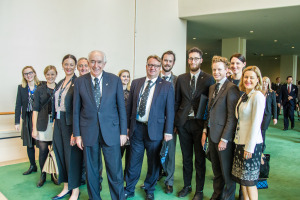By Jacqui True and Anna Powles
November 17, 2014
Delegation of New Zealand following election to the Security Council. Photo by Loey Felipe/UN Photo, used under a Creative Commons licence
The Women, Peace and Security Academic Collective and Women in International Security New Zealand (see note 1) are delighted that New Zealand has won election as non-permanent member on the UN Security Council beginning in January 2015 until December 2016, representing the Western European and other countries group. We see New Zealand as a global advocate for conflict and atrocities prevention, including the prevention of sexual and gender-based violence, and also as an advocate for peacebuilding promoting gender-equal participation in peace and security processes.
It has been 21 years since New Zealand served on the Security Council in 1993-4. At the time New Zealand played a leading role in the Security Council resolution condemning the atrocities in Rwandan “as genocide”. As President of the Council in April 1994 New Zealand ambassador Colin Keating sought to persuade the Council to deploy further UN peacekeeping troops to Rwanda (see Conley-Tyler and Pahlow 2014). Outside the of Council, New Zealand has consistently promoted peacebuilding in the Pacific region, including facilitating local women’s unique roles in ending violence and brokering peace, such as, in the process that culminated in the 2002 Papua New Guinea – Bougainville Peace Agreement. During that process on several occasions official delegations of leaders of women’s organisations were brought to talks in New Zealand to forge a united voice and to enable their greater inclusion in peace processes at home. These initiatives funded by the New Zealand government successfully supported women’s peacebuilding initiatives in Bougainville over a number of years. More recent interventions in the Pacific, including the Regional Assistance Mission to the Solomon Islands (RAMSI) and participation in multiple UN missions in Timor Leste underline the importance of a coherent, context-appropriate and sustained strategy for the inclusion of women in nationbuilding at all levels of governance.
New Zealand’s ten-year campaign for non-permanent membership emphasized the country’s representation of small states in international politics that make up over half of the United Nations membership (109 states). Once on the Council New Zealand has vowed to work for reform to increase the non-permanent membership of the Security Council and lessen the veto power of the P5 to make a positive difference to UN multilateralism, particularly to address concerning situations of conflict and insecurity in the world. In its Security Council campaign, New Zealand did not mention the country’s efforts to advance the Women, Peace and Security agenda at the United Nations and through its foreign development and security policies even though, as the Bourgainville case illustrates, the country has a significant record on WPS. Moreover, New Zealand’s own anti-nuclear security history and identity was founded on widespread women’s peace activism in local communities and at the national level.
In a letter to WPSAC on 9 September 2014, the Minister for Foreign Affairs, the Honourable Murray McCully, wrote “[New Zealand] has a record of “targeting and mainstreaming assistance and promoting the wellbeing of women and girls through our development program and security operations overseas”. Given these commitments, we encourage the New Zealand government to stand up for less powerful, non-state actors, such as, women’s civil society and non-governmental organisations, that are increasingly playing crucial roles in conflict-prevention and peacebuilding as well as for small member states.
In order to make good on its unique WPS record, New Zealand needs to urgently adopt and implement a Women, Peace and Security National Action Plan based on consultations with civil society organisations and actors as well as with government agencies such as the Women’s Development Steering Group in the New Zealand Defence Force. A NAP is crucial for New Zealand to progress its plans to support the “empowerment of women at all levels of the security agenda including promoting the ability of women to act as mediators and men and women to act as gender advisors in situations of conflict” (Minister letter to WPSAC, 9 September, 2014). The recent appointment of a High Level Panel to review UN Peace Operations that included only 3 women but 11 men highlights the persistent gender gaps that continue to undermine women’s voices in international peace and security. We need UN SC members like New Zealand to ensure that women have an equal stake in UN processes and decisions because we need to harness all the groups who can bring about the resolution of conflicts and the creation of lasting peace.
Professor Jacqui True is a specialist in gender and international relations, women, peace and security with a focus on the political economy dimensions of peacebuilding and the long term prevention of violence. She is also specialist in feminist research methodologies. Her articles on gender mainstreaming and global governance rank among the most highly cited in the field.
Dr. Anna Powles, the leader of WIIS New Zealand, is a Senior Lecturer in Security Studies with the Centre for Defence and Security Studies at Massey University. She has previously held positions as the Monitoring & Evaluation Security Sector Specialist with the United Nations Development Programme in Timor Leste, the Timor Leste Analyst with the International Crisis Group, and as Advisor to the Timorese Government advising on the Government’s response to the 2006 crisis.
The original publication can be found here.

